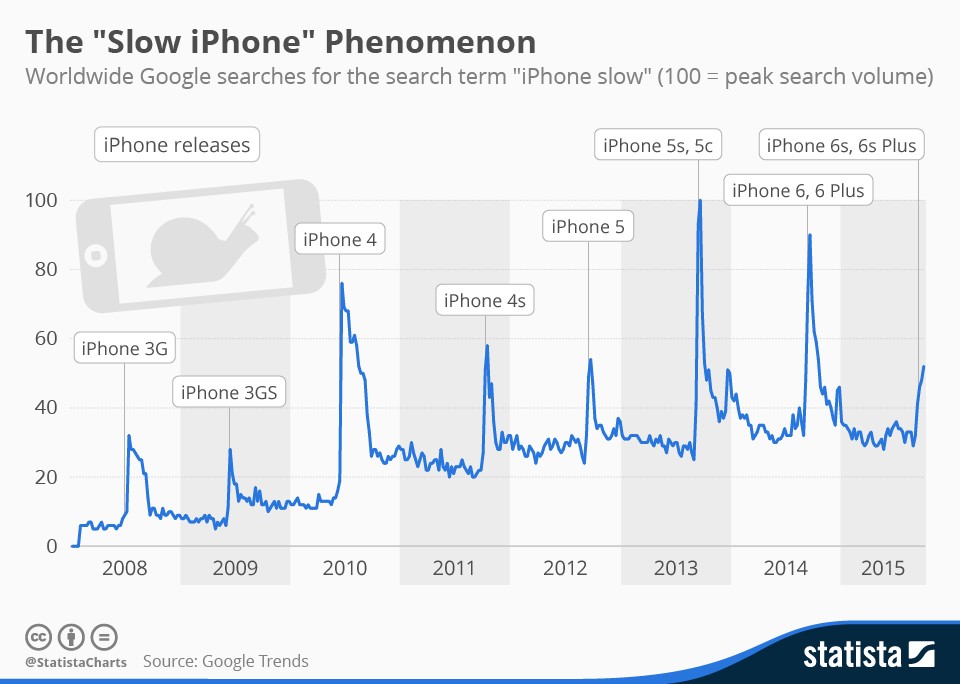
Some consumers have long suspected that Apple purposely slows older-model iPhones to drive sales of its newest releases.
Now a new study authored by a Harvard University PHD student suggests their suspicions could be well-founded.
Google Searches for “iPhone Slow” Surge When Apple Launches a New Phone
To test the theory that Apple purposely slows iPhones to manipulate consumers into purchasing newly-released models, Laura Trucco compared the frequency of worldwide Google searches for “iPhone slow” with searches for “Samsung Galaxy slow”.
The analysis revealed that searches for “iPhone slow” surged whenever Apple released a new model of its enormously popular smartphone. The same pattern has held steady since the iPhone 3G was launched in 2008.
A similar pattern was not observed for the “Samsung Galaxy slow’ search term.
“Wouldn’t many business owners love to make their old product less useful whenever they released a newer one?” Harvard economics professor Sendhil Mullainathan wrote in a recent New York Times column discussing Trucco’s findings.
“When you sell the device and control the operating system, that’s an option.”
Apple Accused of Employing “Planned Obsolescence” to Drive Device Sales
The theory that Apple “throttles” old iPhones to encourage sales of new models has been around for a while. Last year, for example, New York Times writer Catherine Rampell complained that her iPhone 4 had become much slower when its operating system updated to iOS7.
“When major innovations remain out of reach, and degrading durability threatens to tick off loyal customers, companies like Apple can still take a cue from the fashion industry, “she wrote.
‘If you can brainwash consumers into developing new tastes that make the old stuff look uncool for aesthetic rather than functional reasons, you still have a shot at harvesting more sales from your existing customer base.”
According to a report from The Daily Mail, Apple has been accused of engaging in “planned obsolescence” in the past. For example, some have surmised that the company began outfitting its iPhones with tamper-resistant screws in order to prevent users from fixing problems themselves.
Findings Don’t Prove Apple Engaged in Any Wrongdoing
As Mullainathan pointed out, Trucco’s analysis merely proves that a correlation exists between spikes in the “iPhone slow” search term and the release of a new-model iPhone, not that Apple engaged in any wrongdoing.
The fact is, there could be a very benign explanation for the findings, as every new Apple iPhone release coincides with the launch of a new operating system. As the new system is optimized for the latest iPhone, it would likely slow an older model.
Mullainathan also noted that 90% of iPhone users have the most recent operating system on their phones, compared to just 16% of Samsung Galaxy users. That alone could explain the discrepancy between the iPhone and Samsung Galaxy search terms seen in Trucco’s study.
“The important distinction is of intent,” Mullainathan writes “In the benign explanation, a slowdown of old phones is not a specific goal, but merely a side effect of optimizing the operating system for newer hardware. Data on search frequency would not allow us to infer intent.”
So far, Apple has not issued any public comment on Trucco’s findings.